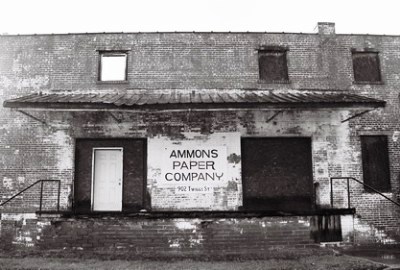
Back in April of 2005, when City of Dust posts were almost exclusively about the Central Savannah River Area, I wrote something regarding the neighborhood James Brown grew up in, a place once known as “The Terry,” a contraction of “Negro Territory.” I described this area, adjacent to downtown on the west and roughly bounded on the north by Walton Way and Laney Walker Boulevard to the south, as containing Augusta’s poorest and most dangerous streets. I also wrote about how, based on what I’d been told, I had decided not to go exploring those streets, which also meant I did not go looking for the childhood home of James Brown.
Shortly after publishing that post, someone by the name of Tawanda left a comment chastising me for believing what I’d been told. She said that the neighborhood was safe and, while people might be curious to know why I was walking around with a camera, no harm would come to me. Re-reading the original post, ACCESS DENIED, I have to say I'm embarrassed by what I wrote and Tawanda was absolutely right; I’d missed an opportunity to see more of Augusta and, what’s more, visit a neighborhood of great historical interest. I was foolish to be intimidated by what I’d heard. Happily, after a weekend visit to Augusta last week, I can now report that the area around James Brown’s childhood home is not a warzone. Further, to see the lot, and perhaps the actual house, where JB grew up was a real treat. So, without further ado, City of Dust returns to Augusta, Georgia:
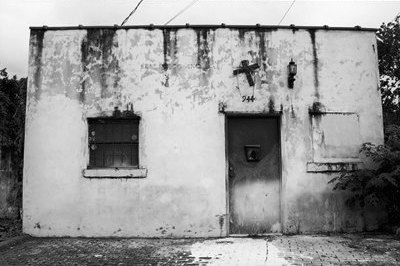
James Brown, Jr. was born in a one-room shack in Barnwell, South Carolina in either 1928 or 1933, although May 3, 1933 seems to be the most accepted date. His parents separated when he was four (some sources say two) and he didn't see his mother again for over two decades. When he was around six, he and his father moved to Augusta and James went to live with his Aunt Honey, who ran a brothel. There, James was reportedly beaten by johns, as well as his father. To pay his way, young James shined shoes and was also sent out to procure customers for his aunt. It is actually unclear from the information I found whether James' father ever lived in the brothel or if he resided elsewhere. In any case, James would have been staying at the address 944 Twiggs St. by the early-to-mid 1930's.
If you do a Google image search for “James Brown’s childhood home” the first photo of a structure you get is one from City of Dust that I can definitely tell you is not the place. However, in 2002, the UK’s Guardian newspaper published a long feature on James Brown by Philip Gourevitch entitled THE TRIP OF A LIFETIME. In it, Mr. Gourevitch is taken on a tour of James Brown’s old stomping grounds by JB himself. They drive around in James’ limo while the Godfather of Soul points out spots of interest, including his boyhood home (that's the lot, at least, in the photo above). I could summarize some of the article, but I think it’ll be more interesting to just plagiarize a few paragraphs:
Here was 944 Twiggs Street, the former brothel where he (i.e., James Brown) lived with his Aunt Honey, the madam - now abandoned and bristling with weeds. Here, by these train tracks, he buck-danced for soldiers passing through town at the start of the second world war; they'd throw him coins, which he took home to Aunt Honey: "Men made 30 cents an hour, 20 cents a hour, 15 cents a hour. I brought her back five dollars to pay the rent for a month." Here was the narrow canal where he once took refuge from the law: "Police were running me, and I saw 'em coming, and I made a few turns, jumped in the water, and breathed through a cane. I saw it in a movie." He mimicked the police, "Where'd he go? Where he at? Where he at? I know I saw him. I swear I saw that boy, Gawd damn." Then he recalled telling himself: "'Now listen up, it's either jail, either reform school, or you stay in the water.' So I stayed in the water." And here was an oil company that he used to rob when he was nine: "That was wrong but was survival."
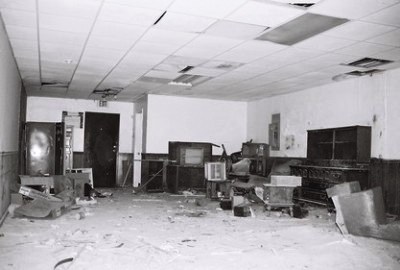
This is the best available information I’ve ever come across regarding the exact location of the brothel where James Brown grew up. Clearly, the place was not most recently a residence but a business of some kind (see above photo). Was the original home—perhaps a shotgun shack—converted for business use or was it torn down and replaced? Who knows? I do know that the building I photographed pre-dates the article, so, as James didn’t say otherwise, I might assume, with some reservation, that this is where JB grew up. (UPDATE: Twiggs St. was renumbered at some point, and Aunt Honey's brothel would've actually been next door, in a lot to the southwest that was a grassy patch with some trees last time I visited.) The remnants of the railroad tracks can still be seen nearby and, indeed, the canal runs right beside the house. It's fascinating to think that James hid from the police in that same canal all those years ago. Below is a photo of the Southern Milling Company complex, which recently caught fire. This is the view that young James would have seen from the front of his house, although not quite so singed.
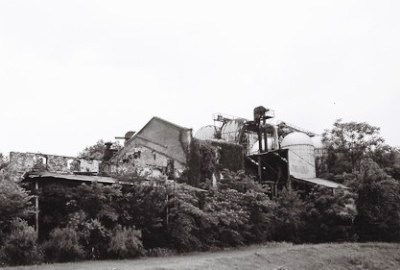
Here’s some more from the article:
As we turned off Twiggs Street on to a narrow and particularly abject strip, called Hopkins Street, Mr. Brown's mood turned sombre. The facade of a brick house on the corner was spray-painted with the words "Fuck the world," and farther along the real estate grew more dismal: Tottering clapboard bungalows, half of them burned out, and the rest, he said, "probably crack houses now. You come from that, you use crack." In this setting, the limo looked like a spaceship, but none of the street's ragtag residents expressed any surprise. They waved from sidewalks and porches, and although they couldn't see through the rain-streaked one-way glass, they called out: "Hello, Mr. Brown" and "God bless, Mr. Brown."
The vehicle could belong to nobody else: Every Thanksgiving, he comes through passing out turkeys, and at Christmas he brings toys. Now, he said, "They want me to help build this place back - What can I do? Get on my knees and pray, and ask, 'Mr. President, come - Mr. Bush, come in here and clean it out and put decent homes in here'?"
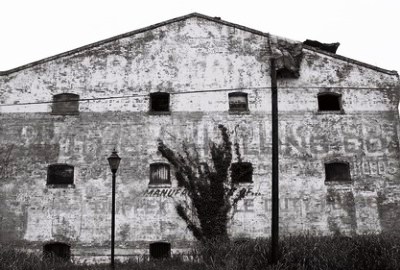
He told his driver to stop outside a broken-down shack, where an emaciated woman and two young men sat on a porch surrounded by household debris. One of the young men stepped forward in the rain, and Mr. Brown lowered his window and held out a $50 bill. The man bowed and withdrew. "Wait a minute," Mr. Brown called after him. "Y'all split that. Give that lady some, too." When he rolled his window up, he told me: "I'm not doin' this because you here. I wasn't gonna do it today. I didn't want you to see me handin' no money out there. I wasn't gonna do it. That's the honest-to-God truth." He sounded embarrassed. "You look at this, it kinda take your breath," he said.
At the end of the block, we reached JAMES BROWN BOULEVARD, and he said, "Out here on these same streets, you may see my daughter, and she has no business out here. She don't have to be there. I give her a home, she got a new Mercedes, and her Mercedes just sitting there. I can't give it to her, 'cause I can't - 'cause she shrug off everything I do."
Now, the picture painted by the article also makes the neighborhood sound dire. And I certainly saw a number of abandoned homes and businesses, some burnt down. But I never saw a single person that appeared menacing. Granted, the rain was pouring down the afternoon I was there, too, but mostly I saw a place where people were doing their best to get by, some in the face of admittedly long odds. There has also been considerable development along James Brown Blvd since James Brown or I last saw Augusta. The effects of this development on the larger neighborhood remain to be seen, but that a face-lift is occurring is undeniable.
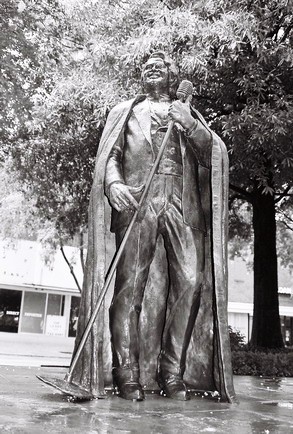 Again, I thank Tawanda for setting me straight and giving me the impetus to find James Brown’s childhood home. If anyone has more information on 944 Twiggs or James Brown’s early residences, please drop me a line. Tawanda, if you happen to read this, please get in touch. I wasn’t able to contact you on this trip, but I may be back in Augusta sometime down the road and would love to take you up on your kind offer of a full tour. Also, many thanks to Mr. Hughes for accompanying me on this outing and providing some historical insight of his own. His website archiving the available information on Henry Shultz and the lost city of HAMBURG SOUTH CAROLINA (site of the HAMBURG RIOT) is well worth spending some time with. The accompanying photo is of the James Brown monument on Broad Street in Augusta. The shot below is another look inside 944 Twiggs St.
Again, I thank Tawanda for setting me straight and giving me the impetus to find James Brown’s childhood home. If anyone has more information on 944 Twiggs or James Brown’s early residences, please drop me a line. Tawanda, if you happen to read this, please get in touch. I wasn’t able to contact you on this trip, but I may be back in Augusta sometime down the road and would love to take you up on your kind offer of a full tour. Also, many thanks to Mr. Hughes for accompanying me on this outing and providing some historical insight of his own. His website archiving the available information on Henry Shultz and the lost city of HAMBURG SOUTH CAROLINA (site of the HAMBURG RIOT) is well worth spending some time with. The accompanying photo is of the James Brown monument on Broad Street in Augusta. The shot below is another look inside 944 Twiggs St.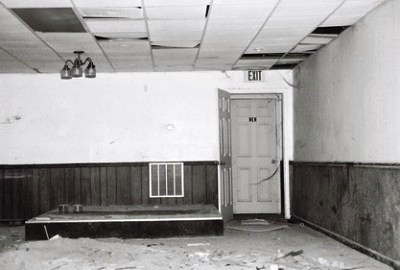
I think next time we’ll visit the mountainside Wild West gold-mining town of Jerome, Arizona and have a look at its famous, if hidden, “sliding” jail. Jerome is also the home of Maynard Keenan, the singer of Tool. Huh.
18 comments:
cool post!
Man my wife, Cheryl Baisden and myself were in this area on Friday and Saturday, June 10-11. We officiated a wedding at Green Grove Baptist church, 1694 was the address. (I think) We saw James Brown Street, and the James Brown arena, and had no Idea we were that close to where the statue was located on Broad st.(we looked for the statue) WOW 944 TWIGGS st...we were right there! JB was the greatest!
Yup, you WERE very close! The 944 Twiggs address, while referred to by JB on several occasions, just doesn't seem to be well-known within Augusta at this point. It even took me YEARS to finally visit the place.
Well, maybe next time, eh?
Thanks for your comment!
JM
The building pictured as "944 Twiggs" actually sits on the lot for what is 938 Twiggs now. There is no 944 Twiggs. The building pictured was built in 1957 according to Augusta's property records. (http://gisweb.augustaga.gov/gisweb/PropertyCard.aspx?pin=047-3-357-00-0&MapPath=%5c%5caugweb005a%5cproxyoutput%5c_ags_a03a5882.jpg&OverlayVals=1|Matt%20Aitken|Marion%20E.%20Barnes|103|DYESS%20PARK|||)
Thanks for the info, DC Nemesis. That's just the kind of research I like to see! It did occur to me that the structure on the lot was not the actual home James Brown grew up in. I read Brown's autobiography recently and the house was described as being two stories tall with a number of large rooms. Of course, the building in the photo looks nothing like that. I thought it was possible that the top story had been removed, but it never occurred to me that what is numbered as 944 Twiggs St. is really 938 Twiggs St.
In the UK Guardian piece that I reference in the post, there's this bit: "Here was 944 Twiggs Street, the former brothel where he (i.e., Brown) lived with his Aunt Honey, the madam - now abandoned and bristling with weeds." The article was published in the fall of 2002. So, my question is: Was the house still standing at that point or was the author adding some embellishment to what was by then just a vacant lot? If the house was there, I'm disappointed not to have seen it because I was living in AGS at that time.
Again, many thanks for sorting that out. JM
Do you have sources?
Anonymous, the main source for the address is mentioned in the text. It's a long article about James Brown written by Philip Gourevitch in 2002 and published by the UK Guardian. The piece is titled, "The Trip of a Lifetime," and can still be found HERE. In it, James himself mentions the address and they stop by the building, which was apparently still standing then. But the building shown here as 944 Twiggs St. is NOT where James Brown grew up. In fact, I've since learned that Twiggs was renumbered at some point and Aunt Honey's brothel would've been the next lot to the southwest, an area which was a grassy patch with a few trees the last time I was there.
Hope that helps. JM
I was just looking through the US census records for 1940 for by Grand-father, great-aunt and her husband. They all lived together in Barnwell, SC during the 1940 Census. Also listed as living with them was a male Servant, aged 11, named James Brown. The census is usually done early in the year. Thus the age of 11 would conform precisely to the servant being born in 1928 or very early in 1929.
I have found nothing online about James Brown, the musical artist, residing in Barnwell, SC in 1940. Do you know if there is any information that could confirm or dispel the possibility that the James Brown who lived with my relatives was the same person as the famous James Brown, the musical icon. Thanks, Kirk G.
Thanks for your comment, Kirk G.! Yours is a most interesting question! While there is some uncertainty, it seems likely that James Brown was born in Barnwell County, SC. Sometimes the year is given as 1928, although James himself said it was 1933. Frankly, who knows? In any case, James is quoted as saying that he lived in "shacks" in Barnwell, but does not ever mention working as a servant. The Brown family moved to Augusta when James was 4 or 5, putting his arrival there sometime in the 1930's. James said that in 1940 he was bringing soldiers back to his Aunt Honey's brothel on Twiggs St. So that timeline doesn't quite align.
That said, with the way things were back then, it's hard to entirely rule out the possibility that the census was referencing the man we came to know as James Brown. It may be unlikely, but I always leave a little room for the unexpected!
By the way, the sources I have at hand are "James Brown: The Godfather of Soul," his autobiography, and "Say It Loud! My Memories of James Brown Soul Brother #1" by Don Rhodes.
Hope that helps! Thanks again! JM
I thought james browns aunt honey lived on 9th Street where the brothel was. That's why it was renamed james brown Boulevard.
Hi Anonymous,
Honey's brothel was definitely at 944 Twiggs. If you watch "Get on Up" you can see a bus with "Twiggs" on the marquee. It's a nod to the street Brown grew up on, although I'm pretty certain no bus ever ran down Twiggs. Ninth Street was certainly part of Brown's stomping grounds, so maybe that's why it got the name. It certainly sees much more traffic than Twiggs.
Thanks for stopping by City of Dust! JM
This is a good read ! I was born in Barnwell in Nov 1953 . My dad built a meager home 5 rooms I believe in Snellings. From '58 till it was burned down in '61. During this time James Brown came to visit his cousins I think down below us 1/4 mile. The Gaines family the boys were numbered as they were born One Gaines. Two Gaines and so forth lastly Seven Gaines. There also was one named John Henry. We all played with the younger ones and JH would ride us on his back like a horse. and boy did they stink ! We are crackers , they weren't. All in all James Brown was in the mix at our house maybe 3 times, wes didn't know who he was till he made it big .
Wow, Unknown. Were the Gaines kids James's cousins? And were the numbers their real names? One through seven and a John Henry? That's pretty crazy. Anyway, that would've been when James was singing with the Famous Flames and just as he was getting some real notoriety. He might've been playing it cool as "Please, Please, Please" was already a big hit by mid-1956. Very interesting indeed.
Thanks for your recollections. JM
Thank you for this wonderful return to the roots of James Brown.
This kind of poverty 'ordinary' young people just do not believe today.
My name is Tom Palaima and I am teaching a course on the historical background behind songs of Bob Dylan and of songs that Bob Dylan has covered.
The poverty and racism and war-mongering and the devastation of the Dust Bowl and the violence behind Jim Crow and the 'propaganda all is phony' misuse of human beings like Ira Hayes. Vietnam War atrocities. The assassinations of JFK, MLK, Robert Kennedy.
All beyond modern comprehension.
Play JB's "Like It Is Like It Was" for the whole story
Here is my transcript:
JB = James Brown and
R = the band member who 'responds' to him
during this spontaneous 'blues walk' late night jam in the studios in Cincinnati in 1970.
JB Have you ever been broke and hungry?
R I have really been broke and hungry many times in my life.
JB I raised up, I, I come up through that kind of thing, you now, broke and hungry.
And every time, I go down the street/ Bronx, New York City,/ San Francisco, Oakland,/
Atlanta, Georgia,/ Houston, Texas,/ Mobile,/ Augusta, Georgia—let me get mine in there—
R Right on.
JB What about it, Jabs [?] ?
JB You know I remember when I used to go to reform school, man, jack,
you couldn't look at me no way
R —look at us—
JB uh, okay, you couldn't look at us no way.
R That's me and you.
JB And mister, and you'd always see the thing, yes sir, 'cause the patches was hanging loose.
You know, if people wanna know why a brother can do down, can get down so much and really do the blues, it's cause he lived the blues, he lived the blues.
R Right.
JB Jack, any time you can't eat. And don't know where you're gonna get your next meal. And if you don't get there early, you won't be able to sleep, in a bed. You'll have to sleep on the floor, or on a pallet.
A pallet. Let me tell you kids, a pallet is something that you, it's just uh, what? A sheet
R —a cloth—
JB a blanket that you spread out on the floor.
A pillow. I never had a pillow until I got a little older.
You know I got my first pair of long underwears, you know how long I was, I mean how old I was?
R How old was you?
JB Nine years old.
R Oh man.
JB The first pairs I got out of a store, you know.
Uh, hey man, I felt so good when I got 'em,
I ran down stairs, jack, and let everybody take a look at 'em.
You know, I was out trying to act like superman, cause I had no other heroes, you understand.
R I've lived that, man. You didn't know about Shaft and all them people.
JB No, I didn't know about Shaft, and Superfly....
And beautiful people like Isaac, brother Isaac Hayes, and Curtis Mayfield, brother Marvin Gaye, Wilson Pickett,
cats like Chuck Jackson and Jackie Wilson,
Bobby Bland, BB King, Muddy.
Thanks, Tom Palaima! I appreciate your comment very much. I actually hadn't heard "Like It Is, Like It Was" before, but I'm listening to it now. Great stuff! I had to track it down on You Tube after reading that transcript.
Coincidentally, I had just finished listening to Bob Dylan's "Murder Most Foul" for the umpteenth time when I received your message. That song covers one or two of the topics you mention!
Thanks again, and I hope you're doing well in these challenging times. JM
Oh wow
Im related to James brown. From what I was told that My uncle Henry Brown was James Brown’s grandfather. That’s what I’ve been told all my life. And my great grandma use to say that James and his father Joseph came by her house with a pink Cadillac
Did you in a club in toccoa ga?
Post a Comment